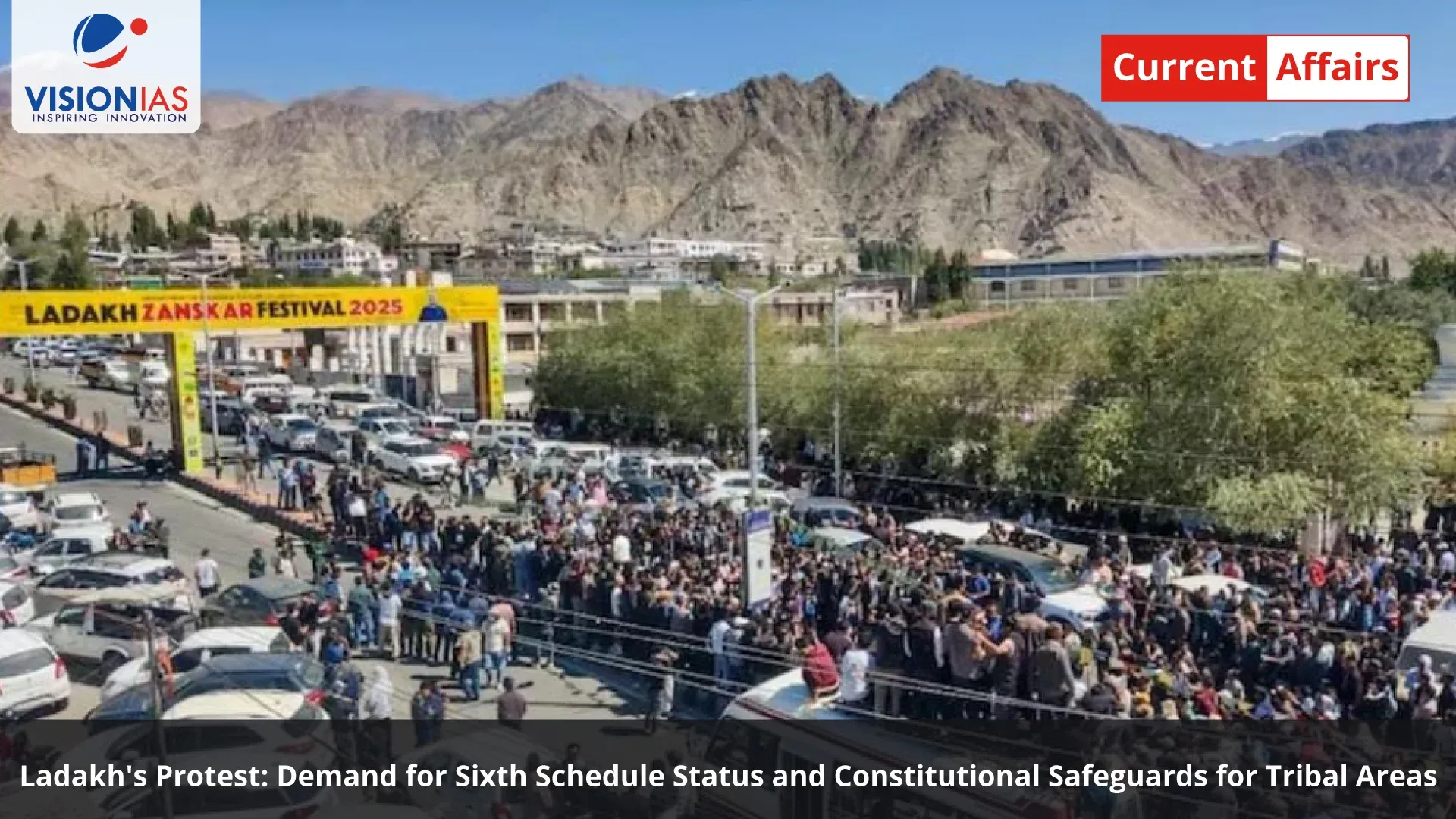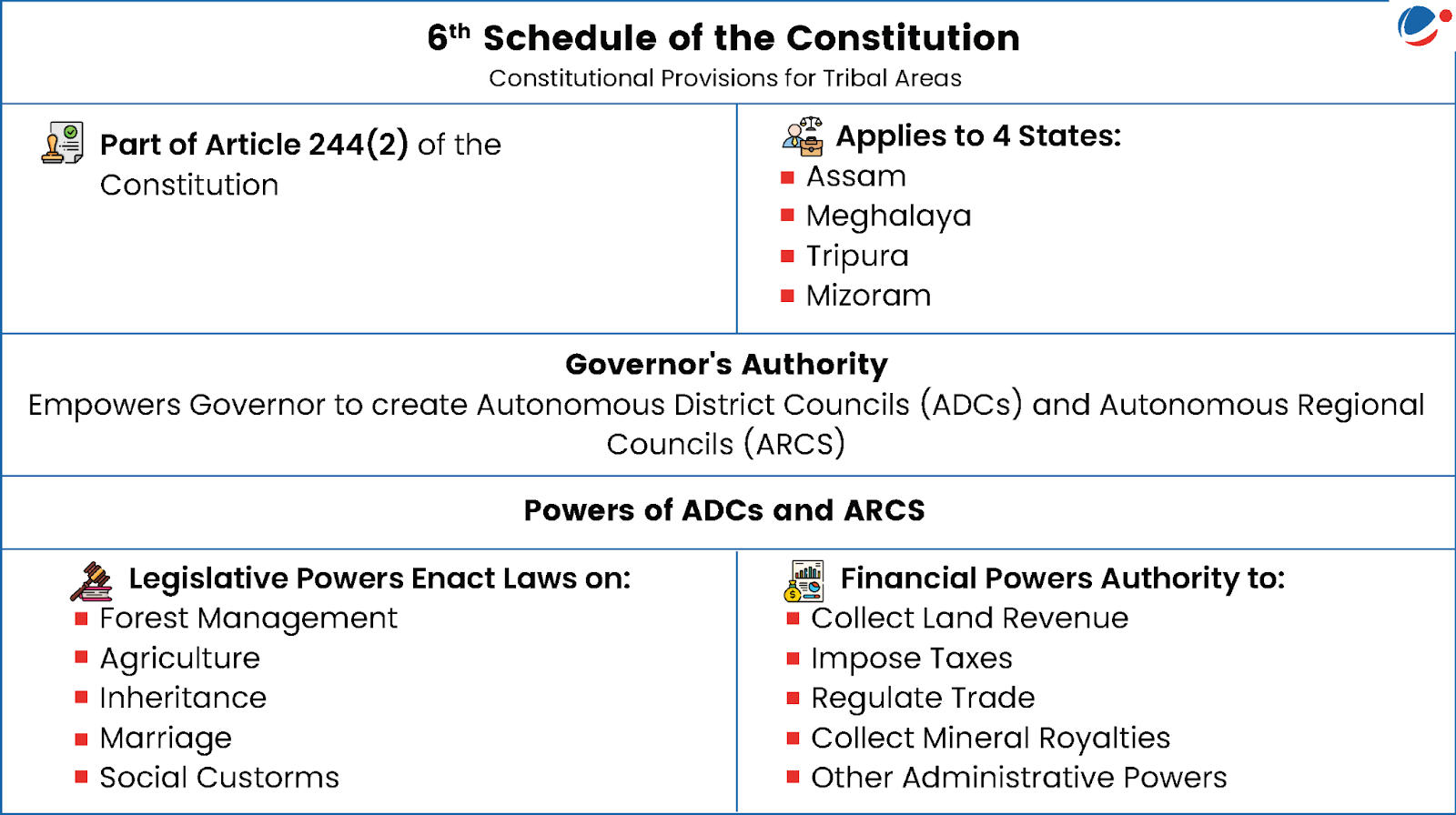Current Affairs
Ladakh’s Protest: Demand for Sixth Schedule Status and Constitutional Safeguards for Tribal Areas

On September 24, 2025, a protest in Leh, Ladakh, demanding constitutional safeguards for Statehood and tribal status under Sixth Schedule turned violent, leading to multiple fatalities and injuries.
On September 24, 2025, in Leh city, Union Territory of Ladakh, a protest demanding constitutional safeguards for Statehood and tribal status escalated into violence, resulting in multiple fatalities and injuries. The situation highlighted the growing tensions in the region as protesters expressed their grievances regarding their political and social rights.
This demand for inclusion under the Sixth Schedule reflects deeper concerns about protecting the region’s unique tribal identity, land rights, and cultural heritage in the wake of significant political reorganization since 2019. The Sixth Schedule represents a specialized framework for autonomous governance in tribal areas, currently applicable to regions in Assam, Meghalaya, Tripura, and Mizoram.
Understanding the Sixth Schedule Framework
Constitutional Provisions and Structure
The Sixth Schedule, enshrined under Article 244(2) and Article 275(1) of the Constitution, provides for the administration of tribal areas through autonomous governance structures. This framework emerged from the Bardoloi Committee’s recommendations, recognizing the need for differentiated governance for tribal communities.
The Schedule empowers state Governors to establish Autonomous District Councils (ADCs) and Autonomous Regional Councils (ARCs) in designated tribal areas. Currently, ten such ADCs operate across the four northeastern states, demonstrating the framework’s practical implementation over decades.

Powers and Functions of Autonomous Councils
ADCs consist of not more than thirty members, with four nominated by the Governor and the remainder elected through adult franchise for five-year terms.
These councils possess powers across four key domains:
- Legislative Powers include authority to make laws regarding land management, forest administration (excluding reserved forests), shifting cultivation, village administration, inheritance laws, marriage and divorce regulations, and social customs. However, all such laws require gubernatorial assent.
- Executive Functions encompass establishing and managing essential public services including primary schools, dispensaries, markets, roads, and waterways. Councils also regulate road transport and have authority over local infrastructure development.
- Judicial Authority allows councils to constitute their own courts for handling disputes involving Scheduled Tribes, though they cannot adjudicate cases involving offenses punishable by death or imprisonment exceeding five years.
- Financial Autonomy grants councils power to assess and collect land revenue, impose taxes on professions and trades, collect tolls, and grant licenses for mineral extraction within their jurisdiction.
Arguments for Sixth Schedule Inclusion
Protection of Land and Identity Rights
The primary argument centers on protecting tribal land rights and cultural identity. Over 97% of Ladakh’s population belongs to Scheduled Tribes, yet the current governance framework under Article 240 does not provide permanent constitutional safeguards against land alienation to non-tribal individuals.
Sixth Schedule status would create legal barriers preventing land transfer to outsiders while preserving traditional livelihood patterns of pastoral communities. This includes Pashmina herders whose grazing lands face pressure from development projects.
Environmental Governance Concerns
Ladakh’s fragile ecosystem faces mounting pressures from tourism and industrial development. The region received 525,000 tourists in 2023, placing enormous strain on water resources and waste management systems in a high-altitude desert environment where ecological recovery is extremely slow.
Large-scale projects, including the proposed mega solar park covering 48,000 acres and geothermal developments in the Puga region, raise concerns about environmental degradation and impacts on traditional livelihoods. Local communities view Sixth Schedule protections as essential for maintaining environmental oversight and sustainable development practices.
Economic and Employment Security
The unemployment rate among graduates in Ladakh stands at 26.5%, double the national average. The absence of a dedicated Public Service Commission and limited local job creation opportunities has fueled economic frustrations, particularly among youth.
The Sixth Schedule framework would provide elected local bodies with greater authority over resource management and development planning, potentially creating more employment opportunities aligned with local needs and capabilities.
Government Response and Alternative Measures
Centre’s Position and Concerns
The Central Government has argued that the Sixth Schedule status was specifically designed for northeastern tribal areas and that expansion would require constitutional amendments.
The Ministry of Home Affairs has expressed concerns that granting such autonomy to a strategically sensitive border region could complicate security coordination and administrative efficiency.
Alternative Constitutional Safeguards
In response to local demands, the Centre has implemented several measures:
- Employment Reservations now reserve 85% of government positions for locals. Definition of local is provided under the Domicile Certificate Rules, 2025. The reservation is in addition to the current 10% reservation for Economically weaker Sections (EWS).
- Political representation has been enhanced through reservation of one-third seats for women in Ladakh Autonomous Hill Development Councils (LAHDC) and acceptance of demands for two Lok Sabha constituencies.
- Cultural Protection measures include recognition of English, Hindi, Urdu, Bhoti, and Purgi as official languages of Ladakh, with institutional support for promoting Shina, Brokskat, Balti, and Ladakhi languages.
Challenges and Considerations
Implementation Complexities
Experience from northeastern states reveals that Sixth Schedule implementation faces significant challenges. ADCs often experience financial dependency on state governments, creating gaps between approved budgets and actual funding that can undermine developmental objectives.
Political interference from state and central governments can limit the effectiveness of autonomous councils, while capacity constraints and governance issues have affected some councils’ performance.
Security Considerations
Ladakh’s sensitive border location raises legitimate questions about balancing local autonomy with national security requirements. However, proponents argue that satisfied, economically secure local populations contribute more effectively to border security than alienated communities.
Conclusion
The situation in Ladakh necessitates the development of innovative constitutional arrangements that merge the principles of the Sixth Schedule with the requirements associated with Union Territory status. Such frameworks aim to enhance local autonomy while ensuring necessary collaboration with central authorities, particularly regarding security and strategic interests.
A tailored approach could empower the Ladakh Autonomous Hill Development Council (LAHDC) with greater legislative authority over local issues, accompanied by oversight mechanisms to safeguard national concerns. To achieve a sustainable resolution, it is essential to rebuild trust between local communities and the Central government through dialogue.

Master Digital Age Governance & Technology Trends with VisionIAS Comprehensive Current Affairs →
Ladakh Sixth Schedule Status FAQs
1. What is Sixth Schedule status in India?
Ans. Constitutional framework providing autonomous governance for tribal areas through elected councils.
2. Why does Ladakh want Sixth Schedule protection?
Ans. To protect tribal land rights and cultural identity from outside encroachment.
3. Which states currently have Sixth Schedule areas?
Ans. Assam, Meghalaya, Tripura, and Mizoram.
4. What powers do Sixth Schedule councils have?
Ans. Legislative, executive, judicial, and financial autonomy over local matters.
5. Which constitutional articles govern the Sixth Schedule?
Ans. Article 244(2) and Article 275(1).















































